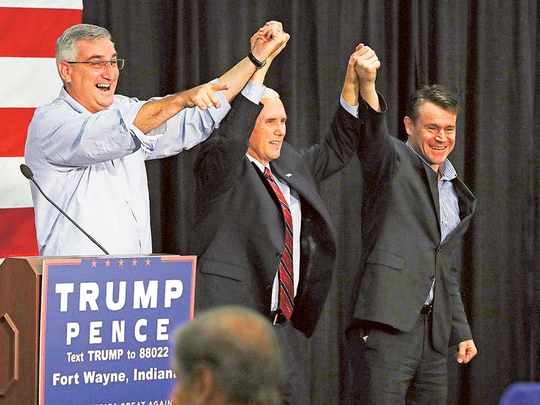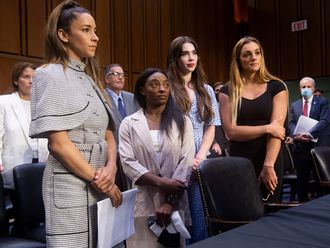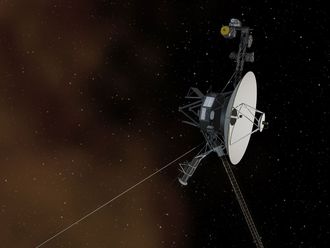
Washington: Psst, there is another debate on Tuesday.
No, not between Donald Trump and Hillary Clinton. They do not suit back up in their gladiatorial armour until next Sunday.
This one is between their running mates, Governor Mike Pence of Indiana and Senator Tim Kaine of Virginia. Voters may be forgiven for barely knowing of it, or allotting it little space on their mental hard drives, because of the incendiary flashes tossed into the race daily from the top of the tickets, especially by Trump.
The meeting of Pence, a Republican, and Kaine, a Democrat, two pensive and little-known nominees, might be the least anticipated vice-presidential debate in 40 years.
“You’re essentially following Ali-Frazer a few days later with a nationally televised book club,” said Tucker Martin, a Republican strategist in Richmond, Virginia, about an hour from the campus of Longwood University, where the vice-presidential debate will take place.
There are several reasons for the lack of excitement, which could rival previous low-interest debates like Al Gore versus Jack Kemp in 1996. That one drew the fewest television viewers, 26.6 million, of any matchup since the first vice presidential debate in 1976.
Neither of this year’s vice-presidential candidates was a national figure at the time he was selected, unlike many past nominees. Neither has set off a media feeding frenzy like previous nominees such as Geraldine A. Ferraro, the first woman on a major party ticket, in 1984 or Sarah Palin, who became a lightning rod for critics in 2008.
Pence and Kaine are both white men in their late 50s, with solid governing resumes, but little reputation beyond their home states. They were safe choices picked in part because they would not detract from the top of the ticket.
“I am boring,” Kaine said shortly before being selected. Pence introduced himself at the Republican National Convention “to those of you who don’t know me, which is most of you.”
Trump represents a merger of presidential politics and reality show.
“Trump has so elevated the interest in any kind of political theatre that a debate that doesn’t have a Trump-like figure by comparison becomes incredibly less entertaining, sadly,” said Dan Senor, a senior adviser to Rep. Paul D. Ryan of Wisconsin in 2012, when Ryan was Mitt Romney’s running mate.
On social media, voters have compared the looming debate to watching “paint dry” and “90 minutes of Kaine and Pence quizzing each other on dad-rock trivia.”
Some strategists have said the debate should draw much more attention because Pence and Kaine are the understudies for candidates who, if elected, would be the oldest president ever to take office (Trump) or the second oldest (Clinton).
Since the conventions in late July, neither Pence nor Kaine has returned to the headlines they received when they were selected. Google Trends shows that interest in the two vice-presidential candidates has flatlined at close to zero.
“Kaine-Pence will most likely produce a very substantive and policy-driven debate, so it’s a real shame there isn’t more interest,” Martin, the Republican strategist, said. “But, hey, once you’ve reduced a presidential campaign to just another reality TV show, you reap what you sow.”
Pence, who is likely to find himself defending Trump’s derogatory comments about women, would be assuming the role of previous nominees who had to make up for stumbles by their running mates in an earlier debate.
In 2012, Vice-President Joe Biden launched a fierce attack on the Republican candidate, Ryan, to calm Democrats who were in near-panic mode over Obama’s poor performance in an earlier debate with Romney. That was also the job of Vice-President George Bush in 1984 after President Reagan had a bad first debate against Walter F. Mondale.
Pence will be called on to have “a calming presence on the panic many people have about the idea of Trump as president,” Senor said.
Neither vice-presidential nominee, each of whom has governed a large state, should have to spend much time assuring viewers of his executive qualifications, as Senator Dan Quayle of Indiana had to do on the Republican ticket in 1988.
Polling before and after vice presidential debates has shown that they do not have much effect on the overall race. A Gallup analysis before the 2012 face-off found that the median change in polling after the vice presidential debates in 1992, 1996, 2000 and 2008 was one percentage point.
The 2008 debate between Palin and Biden was the most watched ever, seen by nearly 70 million viewers, more than for any of the presidential debates that year. Still, in the immediate aftermath, the Democratic ticket gained only 2 percentage points, and the Republicans lost one.












